|
|
|
Sort Order |
|
|
|
Items / Page
|
|
|
|
|
|
|
| Srl | Item |
| 1 |
ID:
149937
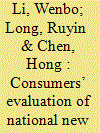

|
|
|
|
|
| Summary/Abstract |
The Chinese government has issued numerous policies to promote the development and adoption of new energy vehicles (NEVs) to address the problem of excessive energy consumption and environmental pollution. In this study we divided these policies into seven categories: macroscopic, demonstration, subsidization, preferential tax, technical support, industry management, and infrastructure. Since consumers’ opinions affect the policy choices of government, based on questionnaire data we use a four paradigm model to analyze the consumers’ evaluation of each policy in terms of perceptions of importance and satisfaction. The results show that macroscopic policies are perceived to be of high importance and satisfaction, whereas for industry management policies they are perceived to be of low importance and satisfaction. The importance perceptions of preferential tax and demonstration policies are low, whereas perceptions of their satisfaction are high. Perceptions of the importance of subsidization, technical support, and infrastructure policies are high, whereas perceptions of their satisfaction are low. We find that the subsidization, technical support, and infrastructure policies need urgent improvement. Finally, we put forward several suggestions to improve the current policies and increase the consumers’ intention to adopt NEVs.
|
|
|
|
|
|
|
|
|
|
|
|
|
|
|
|
| 2 |
ID:
119800
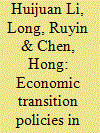

|
|
|
|
|
| Publication |
2013.
|
| Summary/Abstract |
Resource-based cities in China have made momentous contributions to the development of the national economy for decades. However, with the depletion of natural resources, their sustainable development is challenging and transition is important. The Chinese government has made great efforts to help resource-based cities. The purpose of this study is to investigate transition policies and their implementation. Firstly, we reviewed previous studies and summarized the essential elements of some successful resource-based cities, which are useful experiences for Chinese resource-based cities. Secondly, we studied the development of resource-based cities over the past 10 years with a focus on economic development, industrial structure, government revenue and environmental conditions. We found that resource-based cities were less developed compared to other cities. The main reasons are the after-effects of a planned economy, an unreasonable tax system, planning mistakes and misguided resources exploitation policies. Thirdly, we analyzed several aspects of the policy responses after the introduction of transition policies, including designating 69 resource-exhausted cities, supporting cities with funds and projects, formulating transition plans and evaluating transition performance. However, there are some deficiencies in the process of policy implementation. Finally, some recommendations were provided to improve transition performance and sustainable development for resource-based cities.
|
|
|
|
|
|
|
|
|
|
|
|
|
|
|
|
| 3 |
ID:
125762
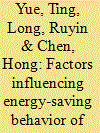

|
|
|
|
|
| Publication |
2013.
|
| Summary/Abstract |
In this research, the willingness of households to adopt different energy-saving behavior has been analyzed, and factors influencing energy-saving behavior in Jiangsu Province, China, have been examined. The study builds on a broad and practical conceptual framework that embraces three types of energy-saving behavior and four dimensions of influencing factors, including socio-demographics, energy-saving awareness, behavioral ability, and situational factors. The empirical results are based on an Internet survey that was sent out to 638 households. The results indicate that socio-demographic characteristics, including age, gender, income level, household structure, and educational background, are all important factors influencing energy-saving behavior. At present, respondents adopt the usage-reduction type of behavior more often than the other two types, which require a greater capacity to pay for energy-efficient products and a higher level of energy-saving awareness. Situational factors have significant positive moderating effects when the variables of behavioral ability and energy-saving awareness act on energy-saving behavior. In addition, the results also show that spatial differences exist among the three regions of Jiangsu Province. Finally, some implications of these results for the design of future incentive policies and measures to encourage energy-saving behavior are presented.
|
|
|
|
|
|
|
|
|
|
|
|
|
|
|
|
| 4 |
ID:
150916


|
|
|
|
|
| Summary/Abstract |
During the “golden decade” (2001–2011) of the coal industry in China, rent-seeking increased in coal mine safety supervision alongside significant improvements in coal mine safety status and increased economic benefits in the coal industry. To explore this internal relationship, we developed a Matlab simulation system and simulated the impact of rent-seeking from each level of the supervision department on coal mine productivity in different scenarios. The results showed the following. (1) Rent-seeking had no significant influence on the average level of material productivity but it had an adverse effect on the average level of mental productivity. Due to the effects of rent-seeking, productivity tended to exhibit unstable and destructive fluctuations, and rent-seeking had the dual effect of promoting and restraining productivity in a wide range with a high frequency. (2) In the supervision scenario, supervision by the high-level department was efficient, and productivity was promoted more by the national and provincial supervision department. (3) In the rent-seeking scenario, each level of the department had an intensity threshold above which coal mine accidents occurred. We also propose suggestions that focuses on the improved supervision of Chinese coal mine safety in three areas based on the “new normal” safety concept.
|
|
|
|
|
|
|
|
|
|
|
|
|
|
|
|
| 5 |
ID:
149874


|
|
|
|
|
| Summary/Abstract |
In the field of low-carbon economics, researchers have become interested in residential consumption as a potential means for reducing carbon emissions. By analyzing and expanding the fundamental concept of personality, a type of personality, namely ecological personality (EP), was defined and a structural model of EP was constructed based on a five-factor model. The study surveyed 890 urban residents to examine the relationship between EP and low-carbon behavioral intention (LCBI). Ecological personality is a five-dimensional concept comprising eco-neuroticism, eco-agreeableness, eco-openness, eco-extraversion, and eco-conscientiousness. Ecological personality traits were positively correlated with the LCBI. However, a quadrifid graph model showed that the EP is not always consistent with LCBI, and respondents fell into two groups: one group comprised ecological residents with consistent traits (positive EP and high LCBI) and non-ecological residents with consistent traits (negative EP and low LCBI), and their EP was consistent with LCBI; the other group comprised ecological residents with gap traits (positive EP and low LCBI) and non-ecological residents with gap traits (negative EP and high LCBI), and neither showed any consistency between personality and intentions. A policy to guide the conversion of different groups into ecological residents with consistent traits is discussed.
|
|
|
|
|
|
|
|
|
|
|
|
|
|
|
|
| 6 |
ID:
171405
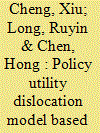

|
|
|
|
|
| Summary/Abstract |
A low-carbon lifestyle is an inevitable choice for mitigating climate change. However, in the actual situation where policy makers and policy target groups are separated from each other, low-carbon lifestyle changes are often manifested as individual strong government actions, behind which social actions are seriously lagging. Based on this observation, in this study a concept of policy utility dislocation was developed, and a policy utility dislocation model was constructed based on prospect theory. Numerical simulation showed that policy utility dislocation can be reduced by increasing the proportion of residents’ environmental benefits, government efforts and subsidies, and reducing the cost of implementing a low-carbon lifestyle for residents. In particular, when the environmental benefits of the government and residents accounted for 15% and 65%, respectively, or the subsidy coefficient was 2, the policy utility dislocation became zero. In addition, policy utility dislocation began to appear when the cost of implementing a low carbon lifestyle exceeded 3. This study enriches the connotation of policy utility and quantifies the policy utility dislocation, and provides new ways to launch policies that promote low-carbon lifestyles.
|
|
|
|
|
|
|
|
|
|
|
|
|
|
|
|
| 7 |
ID:
132605


|
|
|
|
|
| Publication |
2014.
|
| Summary/Abstract |
There are extensive governmental rent-seeking activities in safety supervision of the Chinese coal industry. The rents come from industry safety barriers, low resource taxes, and privilege policies for coalmining enterprises. The rent-seeking mechanism was analyzed using a model comprising dynamic games with incomplete information. The equilibrium results indicate that the probability of national supervision is influenced by penalties and bribery: there is negative correlation with penalties and positive correlation with bribery. The rent-seeking probability of a governmental safety supervision department is influenced by several factors, and positively correlates with the cost of national supervision. The probability of bribery of coalmining enterprises is influenced by several factors, and positively correlates with wages of governmental departments and a reasonable rent-seeking range. Reversed rent-seeking reduces the probability of bribery, but it×s not worth recommending. Some recommendations are proposed.
|
|
|
|
|
|
|
|
|
|
|
|
|
|
|
|
| 8 |
ID:
121343
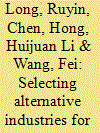

|
|
|
|
|
| Publication |
2013.
|
| Summary/Abstract |
This paper provides a method for choosing alternative industries for resource-based cities that are confronted with resource depletion and have to restructure their industries for future development. The method integrates intra- and inter-regional comparative advantages in a two-dimensional matrix model. We applied this method in an empirical study of Jiaozuo city, China and found that the size of the pool of alternative industries depends on the strictness of the selection criteria.
|
|
|
|
|
|
|
|
|
|
|
|
|
|
|
|
|
|
|
|
|